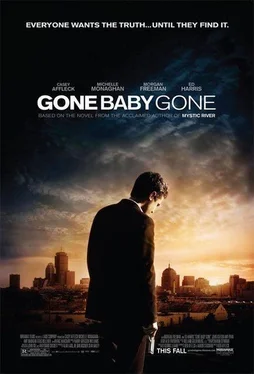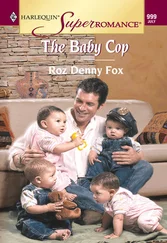Poole closed the trunk and pulled at his trench coat flaps until they covered his shotgun. The shotgun was nestled between his right arm and chest. He held his Glock behind his back in his left hand as he walked up the road, his head tilted up toward the boarded-up windows.
“You see that?” Angie said.
“What?”
“The window to the left of the front door. I think the curtain moved.”
“You sure?”
She shook her head. “I said I ‘think.’” She took her cellular phone from her purse, placed it on her lap.
Poole reached the steps. He raised his left foot toward the first step, and then he must have seen something there he didn’t like, because he extended his leg over the first step, brought his foot down on the second, and climbed up onto the porch.
The porch sagged deeply in the middle, and Poole’s body canted to the left as he stood there, the rain running off the porch between his feet in the gutter formed by the deep sag.
He looked over at the window to the left of the door, kept his head turned that way for a moment, then turned toward the right window, stared at it.
I reached into the glove box, pulled my.45 out.
Angie reached over me and removed her.38, flicked her wrist and checked the cylinder, snapped it back into place.
Poole approached the door and raised the hand that held the Glock, rapped on the wood with his knuckles. He stepped back, waited. His head turned to the left, then to the right, then back to the door. He leaned forward and rapped the wood again.
The rain barely made noise as it fell. The drops were thin and the sheets fell at an angle, and except for the high-pitched moan of the wind, the road outside the car was silent.
Poole leaned forward and twisted the doorknob to the right and left. The door remained closed. He knocked a third time.
A car drove past, a beige Volvo station wagon with bicycles tied to the roof rack, a woman with a peach headband and a pinched nervous face hunched over the wheel. We watched her brake lights flare red at the stop sign a hundred yards down the road; then the car turned left and disappeared.
The blast of a shotgun from the back of the house ripped through the moaning wind, and glass shattered. Something shrieked in the whispering rain like the clack of damaged brakes.
Poole looked back at us for a moment. Then he raised his foot to kick in the door and disappeared in an eruption of splinters and fire and bursts of light, the chattering of an automatic weapon.
The blast blew him off his feet, and he hit the porch banister so hard it cracked and peeled back from the porch like an arm snapped free at the shoulder socket. Poole’s Glock jumped out of his hand and landed in the flower bed below the porch and his shotgun clattered down the steps.
And the gunfire stopped as suddenly as it had started.
For a moment, we froze inside the car, inside the din left in the aftermath of the gunfire. Poole’s shotgun slid off the last step and the stock disappeared in the grass as the barrel shone black and wet on the pavement. A strong gust blew the rain with renewed force, and the small house whined and creaked as the gust pushed hard against its roof, rattled its windows.
I opened the car door and stepped out on the road, kept myself low as I ran toward the house. In the soft hiss of the rain, I could hear the thump of my rubber soles on the wet tar and gravel.
Angie ran beside me, the cellular phone up by her right ear and the corner of her mouth. “Officer down at 322 Admiral Farragut Road in Germantown. Say again: Officer down at 322 Admiral Farragut, Germantown.”
As we ran up the walkway leading to the steps, my eyes darted from the windows to the door and back again. The door had been eviscerated, as if large animals had attacked it with stiletto claws. The wood was gouged in ragged teardrops; in several places I could see through the holes into the house, catch quick glimpses of muted colors or light.
As we reached the steps, the holes were suddenly obscured by darkness. I swung out with my right arm, knocked Angie off her feet and onto the lawn as I dove left.
It was as if the world exploded. Nothing prepares you for the sound of a gun firing seven rounds a second. Through a wooden door, the rage of the bullets sounded almost human, a cacophony of biting, rabid homicide.
Poole flopped to his left as the bullets spit off the porch, and I reached down into the grass by my feet, curled my hand around the stock of his shotgun. I holstered my.45 and rose to one knee. I pointed through the rain and fired into the door, and the wood belched smoke. When the smoke cleared, I was looking at a hole in the center the size of my fist. I rose off my knee but slipped on the wet grass and heard glass tinkling to my left.
I spun and fired over the porch banister into the window, blew the glass and frame to pieces, ripped a hole in the dark curtain.
Inside the house, someone screamed.
The gunfire had stopped. Echoes of the shotgun blasts and the chatter of the automatic weapon stormed through my head.
Angie was on her knees by the bottom of the steps, a tight grimace on her face,.38 pointed at the hole in the door.
“You all right?” I said.
“My ankle’s fucked up.”
“Shot?”
She shook her head, her eyes never leaving the door. “I think it snapped when you pushed me to the ground.” She took a long breath through pursed lips.
“Snapped as in broken?”
She nodded, sucked in another breath.
Poole moaned, and blood slid from the corner of his mouth in a bright, swift current.
“I have to get him off the porch,” I said.
Angie nodded. “I’ll cover.”
I laid the shotgun on the wet grass and reached up, grabbed the top of the banister Poole had bent back when his body had slammed into it. I put my foot against the foundation of the porch and pulled down, felt the base of the banister wrench away from the rotted wood. I gave it another hard pull and the banister and half the railing ripped away from the porch. Poole tumbled back into me, knocked me to the wet grass.
He moaned again and writhed in my arms, and I slid out from under him, saw the curtain in the right window move.
I said, “Angie,” but she’d already pivoted. She fired three rounds into the window and glass spit out of the frame, showered to the porch.
I crouched by the low bushes along the foundation, but no one returned fire and Poole’s back arched off the lawn and a mist of blood burst from his lips.
Angie lowered her gun, took one last long look at the door and the windows, then scrambled across the walk toward us on her knees, her left ankle twisted and held aloft as she pulled herself forward. I drew my.45, pointed over her as she crawled past, and then slid over to the other side of Poole.
Another eruption of automatic weapon fire tore through the back of the house.
“Broussard.” Poole spit the word as he grabbed Angie’s arm, his heels kicking at the grass.
Angie looked at me.
“Broussard,” Poole said again, a thick gurgle in his throat, his back arching off the grass.
Angie pulled her sweatshirt over her head, pressed it to the dark fountain of blood in the center of Poole’s chest. “Sssh.” She placed a hand on his cheek. “Sssh.”
Whoever was firing in the back of the house had a huge clip. For a full twenty seconds, I could hear the staccato screech of that gun. There was a brief pause, then it started again. I wasn’t sure if it was the Calico or some other automatic weapon, but it didn’t make much difference. A machine gun is a machine gun.
I closed my eyes for just a second, swallowed against a painfully dry throat, felt the adrenaline wash through my blood like toxic fuel.
“Patrick,” Angie said, “don’t even fucking think about it.”
Читать дальше
Конец ознакомительного отрывка
Купить книгу












